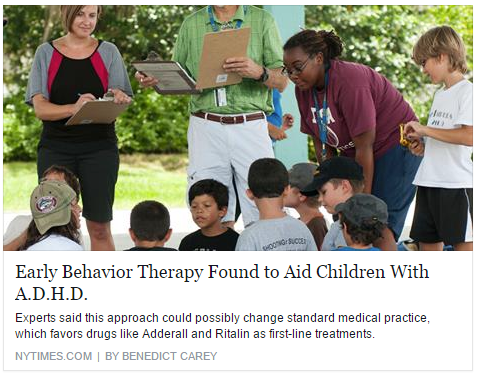When I see ADHD trending on social media, I perk up my ears. Today, it’s the release of new study results supporting behavior therapy as a first-line treatment for children with ADHD.
This raises important questions. It also fans the flames of controversy among those opposed to medicating ADHD in children.
I see this study as an incomplete answer to a complex question: what’s the best course of treatment for childhood ADHD?
Interpreting results: why start with behavior therapy?
Starting with behavior-based interventions may emphasize the importance of teaching coping mechanisms. I’ve long said that neither medication nor behavior therapy can do it alone. Medication balances our brain chemistry, making coping mechanisms easier — or possible — to implement.
Starting meds with no therapy or parent training may set the wrong expectation: that meds can do all the work. Starting with behavior therapy, then adding medication, allows families to compare and contrast the difference.
Taking an example from my personal life, I talk a lot about David Allen’s Getting Things Done. I swear by it. Did you know I’ve only been able to maintain it while taking medication? Without it, I can’t keep up.
However, medication in no way alleviates my need for such a rigid system.
We should teach children this symbiosis from the beginning. Offering medication alone is like offering eyeglasses to a near-sighted child and expecting those glasses to teach him to read.
Why I’m skeptical about behavior therapy’s long-term benefits
I’m not jumping on the behavior modification bandwagon just yet. I think we need a longitudinal study to evaluate the effects well into adulthood, when we’re expected to create our own structure and motivation.
Behavior modification therapies, as explained in Stephen P. Hinshaw and Katherine Ellison’s book ADHD: What Everyone Needs to Know, require “clear expectations and explicit, frequent rewards, as well as occasional, nonemotional discipline.” Think sticker charts to help kids earn a reward for improving target behaviors.
My own parents promised me a TV in my bedroom if I could produce a few second-grade report cards with no failing grades in the ‘behavior’ column. My burning desire for that television supported the herculean effort required to stay out of trouble. I got the TV.
Looking at this one academic year, anyone could conclude that behavior-based interventions improved my most problematic symptoms. However, as Hinshaw and Ellison point out in their book, “the difficulty for children is to maintain their progress once they’re out of the tightly managed environment.”
My third-grade reports reflect missed homework, inconsistent effort, and frequent run-ins with other students.
Should we expect parents to maintain a highly structured environment indefinitely? What happens when children grow too old for sticker charts? What happens when parents aren’t there to light a fire under a kid’s butt?
I’ll tell you what happened to me: my life spiraled out of control. My desk at work was covered 8-12 inches deep all around with papers, and I frequently lost important documents. I fought with my husband all the time. I suffered wild mood swings. Bills went unpaid. It took so long for me to take checks to the bank, they often expired before I could deposit them. My house was a mess. The list goes on.
Does behavior therapy prepare kids with ADHD for the future?
I’m not surprised to see a study confirming the effectiveness of behavior therapies — that is, rigid systems of externalized rewards and consequences — in the short term. We’re talking months, or even a few years.
I worry that we’re failing to teach kids true independence and long-term coping mechanisms. As Vicki Hoefle explains so effectively in her lovely book Duct Tape Parenting, parents should measure success not by how kids behave right now, but whether they’re ready to fledge at age 18. Childhood gives kids an opportunity to learn crucial skills in a safe, supportive environment.
Creating a system of made-up consequences robs them — and us — of that opportunity. Sure, I was able to control my outbursts to earn that TV. What did I learn about myself during that time? What tools did I put in my mental toolbox, to be carried into adulthood?
Yes, this study addresses an important issue. I hope it reinforces the symbiotic relationship between medication and other interventions. I hope fewer parents, teachers, and doctors see medication as a way to make ADHD an open-and-shut case.
Parents need to ask: what’s our goal here? Do we want the best of both worlds? To refuse medication for our kids while putting a stop to failing grades and uncomfortable parent-teacher conferences?
Or do we want to deepen our relationship with our kids while teaching them how to succeed as adults?
For that, we need to examine the effectiveness of behavior therapy once the subjects reach age 25, 30, and 35.
What do you think we’d find? I’m curious about others’ reactions. Did you read about this study? Have you had any first-hand experience with behavior modification? Please chime in with a comment below!
Hey there! Are you enjoying The ADHD Homestead?
Here's the thing: I don't like ads. I don't want to sell your attention to an advertising service run by the world's biggest data mining company. I also value my integrity and my readers' trust above all, which means I accept very few sponsorships/partnerships.
So I'm asking for your support directly. For the cost of one cup of coffee, you can help keep this site unbiased and ad-free.
Below you will find two buttons. The first lets you join our crew of Patreon pals and pledge monthly support for my work. Patrons also have access to my Audioblogs podcast. The second takes you to a simple donation page to pledge one-time or recurring support for The ADHD Homestead, no frills, no strings. Do whichever feels best for you!


